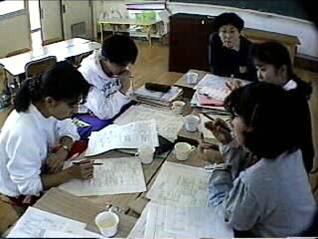
Sabtu, 13 Juni 2009
Lesson Study File
http://lessonstudy.blogs.com/
http://www.lessonresearch.net/
http://www.rbs.org/lesson_study/
http://www.rbs.org/Special-Topics/Lesson-Study/Lesson-Study-Conference-2002/204/
http://www.rbs.org/Special-Topics/Lesson-Study/Lesson-Study-Conference-2002/Why-Lesson-Study/207/
http://www.rbs.org/Special-Topics/Lesson-Study/Glossary-of-Lesson-Study-Terms/212/
http://www.lessonresearch.net/
http://www.rbs.org/lesson_study/
http://www.rbs.org/Special-Topics/Lesson-Study/Lesson-Study-Conference-2002/204/
http://www.rbs.org/Special-Topics/Lesson-Study/Lesson-Study-Conference-2002/Why-Lesson-Study/207/
http://www.rbs.org/Special-Topics/Lesson-Study/Glossary-of-Lesson-Study-Terms/212/
What is Lesson Study
What is Lesson Study?
Student achievement in the United States has continued to decline over the past decade. Recent international comparisons in the areas of mathematics and science have shown little to no growth and our children continue to fall behind most industrialized nations (Stigler & Hiebert, 1999). As a response to this continuing decline, national and state boards of education have attempted to remedy this problem by increasing school accountability measures. Educational reform efforts have also responded to these pressures from high stakes accountability programs. Instead of creating programs which focus on improving the practice of teaching and learning, recent reform efforts have focused on designing classrooms with teacher proof curriculum. District and schools across the country are currently devoting numerous planning hours focusing on strategies for aligning grade level curriculum to yearly high stakes tests. While these meetings may provide an opportunity for better curriculum alignment, they do not get at the core of student failure, ineffective instructional practices.
Instructional practices can only be changed through examination of teaching practices and its impact on student learning. In order for this to occur, schools need to create a process for teachers to systematically study teaching strategies and lessons that will increase student achievement. Unfortunately, teachers do not currently have any systematic way to collaborate and change instructional practices. Change is left to individual teacher or school site. Teachers and administrators are left to stumble upon “effective” teaching strategies and lessons, or worse yet rely upon the pendulum swing of latest educational reform efforts. All too often experienced teachers “wait out” these new reform movements. Teachers continue to implement methods they have utilized since the start of their teaching career. The teaching status quo continues not because teachers are lazy or desire to utilize ineffective teaching strategies, but rather that no alternative is provided. Professional development programs for teachers have remained the focus of educational change since the 1990's. This interest, however, has continued to produce inadequate gains in student achievement. Professional development program need to “provide teachers with an opportunity to learn about teaching” (Stigler & Heibert, pp. 12-13).
Many excellent new teaching practices are never fully implemented in the teaching profession because the culture of teaching prohibits a critical mass from ever forming. Research shows that teachers rely on their first two years as a guidepost for teaching techniques. These teaching practices often remain in place their entire teaching careers. Teaching strategies they stumbled upon in these first two years set the foundation for the classroom learning for generations of students. Worse yet, teachers often rely on the ineffective strategies modeled to them as children in their k-12 classrooms.
Lesson study provides one way in which teachers can systematically improve instruction and decrease teacher isolation, if it can be sustained over time. Lesson study provides a process for teachers to collaborate and design lessons while examining successful teaching strategies to increase student learning. In the process of lesson study, teacher work together to plan, teach and observe a cooperatively developed lesson. While one teacher implements the lesson in the classroom, others observe and take notes on student questions and understanding. The development of an “ideal lesson” is not the critical component in the lesson study process (Lewis, 2000). Focus on student learning and professional collaboration is what drives the group process.
The purpose of this study is to help increase teacher collaboration and improve classroom instruction in the area of mathematics and to see if this innovation can be institutionalized and sustained at the school house level. This study will examine an alternative approach, the use of the lesson study process with professional development as the vehicle to reshape the culture of teaching. Current research in the area of lesson study illustrates that collaboration of teachers, through the use of lesson study groups, increases student achievement and decreases teacher isolation (Lewis, 2000). This study examines lesson study as a process for improving teacher practice and creating a greater learning experience in k-12 classrooms.
Other Research Sites:
City Heights Educational Collaborative- TE604 (City Heights Lesson StudyWeb Site – In Progress) http://lessonstudy.netOther Research Sites: (Good Starting Point for AnnotatedBibliography)
http://www.tc.columbia.edu/lessonstudy/
http://lessonresearch.net/
http://www.rbs.org/currents/0502/what_is_lesson_study.shtml
http://www.lessonlab.com/
http://www.nwrel.org/nwreport/nov01/nwteach.html
Langganan:
Postingan (Atom)




